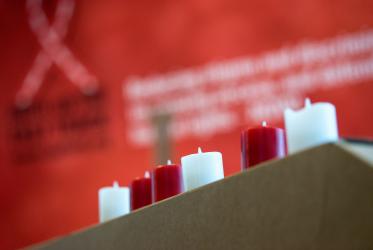By Albin Hillert*
Ours is a world of migration. Yet myths and mystification persist in our understanding of the journey – particularly when it comes to transmittable diseases such as HIV.
Millions upon millions of people are currently on the move – whether it is to seek refuge in a foreign country, because of internal conflict and displacement, as victims of human trafficking, or in seeking employment and improved living conditions.
Becoming a migrant can place a person at increased risk of vulnerability to HIV, as it often entails being exposed to poor living and working conditions, social exclusion, labor exploitation, abuse and violence, including sexual violence.
Yet in many places, the complex obstacles facing refugees and migrants also include a lack of access to health-care services and social protection. And what is more, many experience a disconnect between health-care providers and other actors working to support migrants and refugees.
How can the gaps be bridged?
“If someone had asked me when I migrated many years ago, if I would ever need services around HIV, I would definitely have said strongly no,” says Wangari Tharao, reflecting on her own experience as a migrant moving from Kenya to Canada.
Today, Tharao is representative of the NGO Delegation to the UNAIDS Programme Coordinating Board. “Because I work for an organization that provides health-care services to immigrants and refugees,” she says, “I see that how I felt about HIV those many years ago, is still the same. The HIV epidemic has expanded, but the way we deal with HIV as migrants is still the same.”
To overcome this challenge, faith-based organizations, civil society partners and UN agencies are working together to reinforce efforts and strengthen collaboration in providing services and addressing HIV risk among migrants and refugees.
Rev. Msgr Robert J. Vitillo, general secretary of the International Catholic Migration Commission and attaché on health for the Permanent Observer Mission of the Holy See to the United Nations in Geneva, is one of the facilitators of the process.
Contrary to popular belief, Vitillo says, “statistics tells us that it is more common for migrants to become infected with HIV in their host country, than it is to bring the virus with them from their home countries.”
Speaking on a panel on HIV and migration on 20 February, World Council of Churches (WCC) general secretary Rev. Dr Olav Fykse Tveit remarked, “in the host countries, migrants underutilize health services for fear of deportation, or for lack of explicit access to health services or to health insurance, or because of language or cultural barriers.”
“Migrants are often perceived as the carriers of diseases, while the truth is that they are the victims of negligence and indifference during the journey to and or in the host country,” Tveit said.
Where do faith-based organizations come in?
“Faith communities have great potential, and a responsibility, to help demystify and debunk myths on HIV and migration,” says Francesca Merico, coordinator of the WCC-Ecumenical Advocacy Alliance HIV Campaign.
But there are also very practical challenges. How do you adhere to treatment for HIV when living conditions do not allow you access to private space? And how do you overcome the challenge of HIV medication requiring steady access to nutritious food?
“We know that refugees often receive different types of support, but there are gaps between the different services. If we can ensure increased awareness of the issues migrants and refugees face in relation to HIV, faith communities can play an important role in bridging these gaps,” Merico adds.
Health programme manager Augustin Tual Sian Piang from the National Office of Caritas Myanmar continues to stress the potential of faith communities to bring about change, and of the great influence faith leaders have in their communities. “When something happens at the grassroots level, people first reach out to the faith community, before going to a large NGO. But also, change of behaviour comes from a change of the heart. So this comes down to our values.”
“This is about dignity, and about identity,” adds Dr Carlos van der Laat, Migrants Health Assistance programme coordinator of the Migration Health Division of the International Organization for Migration. “This is the strength of FBOs. That the response is centred on the human being, which can really change the way people receive treatment.”
*Albin Hillert is communication officer for the World Council of Churches
“Join forces, work together” – WCC convenes workshop on HIV among migrants, refugees (WCC press release 20 February 2019)










